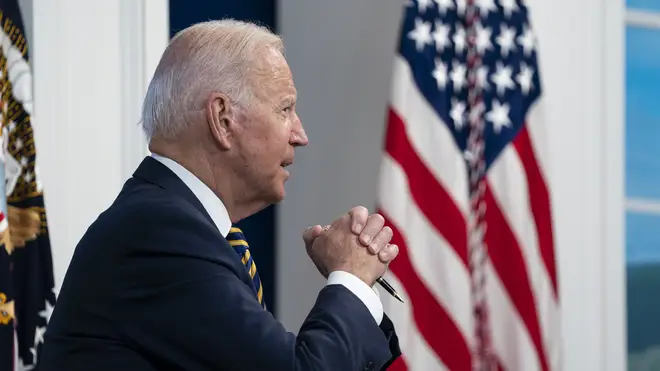
Nick Ferrari 7am - 10am
17 September 2021, 17:44

Friday’s session opened with the US president announcing a new US-European pledge to cut climate-wrecking methane leaks.
US president Joe Biden tried to hammer out the world’s next steps against rapidly worsening climate change in a private, virtual session with a small group of other global leaders on Friday, and announced a new US-European pledge to cut climate-wrecking methane leaks.
Ever-grimmer findings from scientists this year that the world is nearing the point where the level of climate damage from burning oil, gas and coal becomes catastrophic and irreversible “represent a code red for humanity”, Mr Biden said at the session’s outset.
“We have to act and we have to act now,” Mr Biden said, speaking on a specially erected White House set that showed virtual arrays of solar panels in the background and a wall of other global leaders listening on screens.
The Biden administration billed the meeting as a chance for some of the world leaders to strategise how to achieve big, fast cuts in climate-wrecking petroleum and coal emissions.
The administration also is trying to re-establish the United States’ Major Economies Forum — a climate group set up by President Barack Obama and revived by Mr Biden – as a significant forum for international climate negotiations.

Friday’s meeting followed a much bigger and splashier virtual White House climate summit in April that saw scores of heads of governments — representing allies and rivals, and big economies and small — making sweeping speeches about the need for action against climate change.
The list provided of Friday’s attendees included only a dozen leaders: those of Argentina, Australia, Bangladesh, the European Commission, the European Council, Indonesia, Italy, Japan, South Korea, Mexico, the United Kingdom and the United Nations.
China, India and Russia, with the United States, are the nations that emit the most climate-damaging gases from the production and burning of oil, natural gas and coal. There was no word on their leaders’ taking part.
However, the White House said in a statement that Mr Biden had directed his climate envoy, John Kerry, to lead a minister-level climate session afterwards with China, Germany, India, and Russia. It gave no other immediate details.
Climate advocates have stressed the importance of the US coordinating with Europe and Asia for a joint front in coaxing China, which emits more climate-damaging fumes than the rest of the developed world combined, to move faster on cutting its use of dirty-burning coal-fired power plants in particular.
Mr Biden, in the public opening of the otherwise private talks, also discussed a new US agreement with the European Union aiming at cutting the two entities’ emissions of methane 30% by the end of this decade.

Methane is a potent agent of climate damage that wafts up by the ton from countless uncapped oil and gas rigs, leaky natural gas pipelines, and other oil and gas facilities.
Fred Krupp, president of the nonprofit Environmental Defence Fund, said cutting methane pollution is the single fastest, most effective strategy to slow the rate of warming.
A 30% reduction in methane pollution should be only “the entry point for this critical conversation. Many countries can and should aim even higher,” Mr Krupp said.
Mr Biden has sought to make the US a leader again in global climate efforts after President Donald Trump removed the US from the Paris climate accord.
At home, however, Mr Biden is still striving to get significant investment in climate-friendly measures like charging stations for electric vehicles out of Congress, in the face of objections from Republicans and some Democrats.
Friday’s session will be followed by another closed-door session of 35 to 40 world leaders, to be hosted on Monday morning by United Nations Secretary-General Antonio Guterres and Prime Minister Boris Johnson.
The private sessions are seeking to ensure global leaders come to a November UN climate session with commitments of significant new actions to slow climate change.
Mr Biden and others bill the UN climate summit in Glasgow as a last chance for the world to commit to cutting use of fossil fuels fast enough to stave off the worse scenarios of global warming.
“We have to bring to Glasgow our highest possible ambitions,” Mr Biden said. “Those that have not yet done so, time is running out.”